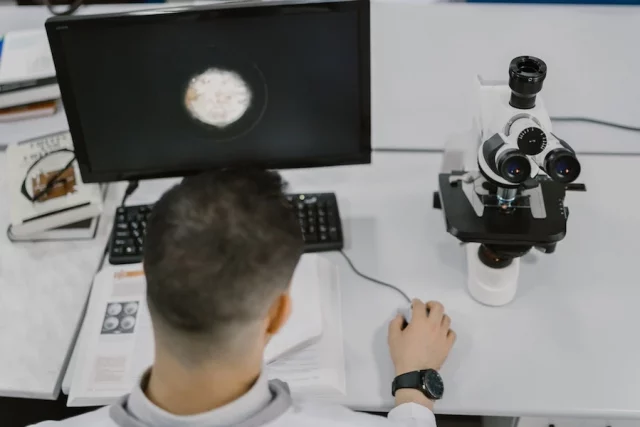AI has the potential to revolutionize medicine. A growing body of research results and reports suggests that AI could help doctors diagnose diseases and improve patient care. In a recent study, researchers trained a deep-learning network to detect tuberculosis with near-perfect accuracy. That could be especially useful in areas with a shortage of radiologists. Another study showed that machine-learning algorithms could improve cardiovascular risk prediction. Software development healthcare industry work is a promising first step in AI and medicine.
What Is AI And How Does It Work?
AI automates vital processes and streamlines processes. It can help doctors diagnose diseases and provide better care to patients. It can also make claims more accurate, allowing hospitals to accept more insurance plans. This technology can also help hospitals reduce costs and improve patient service. While AI is helping healthcare professionals automate procedures, human supervision is still necessary for many medical settings. AI can detect vital behavioral patterns and diagnose medical complications, but human observation and judgment are vital.
In recent years, AI has become more sophisticated, eliminating mistakes in diagnosis and treatment, or simply helping clinicians with repetitive tasks. AI can even help develop new treatments and therapies for patients. This technology is rapidly advancing in the medical field, thanks to the increasing availability of digital medical records. However, it isn’t without its challenges. AI isn’t perfect and requires human supervision, especially regarding social variables. Moreover, it is vulnerable to cyberattacks and cannot identify and treat every condition that may occur in an individual.
For instance, AI can improve infection control and prevent antibiotic resistance. It can also help doctors review images more accurately. It can also identify essential insights from large digital images and potential errors in reading EHRs. Moreover, AI can aid a clinician in diagnosing a disease faster and more accurately. In addition to this, AI can improve productivity.
Does Medicine Need AI Workers?
Currently, AI can help medical practitioners by automating many routine tasks. For example, medical providers spend much time with electronic medical records, typing away on keyboards in exam rooms. AI systems can queue up the most relevant information in a patient’s medical records, distill conversations and appointments into structured data, and improve patient care by freeing up providers’ time.
The algorithms can identify suspicious regions and classify them with ease. For instance, AI algorithms can detect abnormalities in histology slides. The AI system can also detect patterns in patient data that may indicate an underlying condition.
Despite these benefits, AI systems are not perfect and can make mistakes. AI systems can make mistakes, resulting in injuries or healthcare complications. Moreover, these algorithms may not reflect the demographics of the patients. White males dominate most medical data sets. As a result, AI may make better predictions for the majority population, which is detrimental to minority populations.
AI can save medical professionals time and improve the efficiency of their practices. It can also organize patient data into portals, diagnose patients, and provide second opinions for doctors. This technology can also extend healthcare services to remote regions.
The Benefits Of AI In Medicine
One of the most relevant and fresh National Institutes of Health (NIH) studies showed that AI is 99% accurate at diagnosing metastatic breast cancer. The AI system can detect cancer cells that have spread throughout a patient’s body, which is nearly impossible for a human pathologist to notice. Without AI, pathologists can miss up to 60% of small tumors. While AI cannot replace doctors, it can be used alongside other medical devices.
AI helps doctors make better diagnoses and treat patients faster. It also helps speed up the claims process, which allows hospitals to accept more insurance plans. Furthermore, doctors can spend more time evaluating patients rather than wasting time on paperwork. The technology can also make healthcare services more accessible to patients, reducing wait times and costs for everyone involved.
As the development of AI continues, health care providers will find that it can be very helpful in improving care and reducing costs. It will also improve workflow by making physicians more efficient in care delivery and help them identify risks early. It will also provide unblinking watchdogs against medical errors, which kill 200,000 people every year and cost nearly $1.9 billion a year.
While AI is highly effective in performing specific tasks, it is still far from perfect. It must work alongside human physicians to ensure the best results. For instance, a radiology robot cannot diagnose a patient unless a human radiologist performs the procedure. Humans are still needed to provide guidance and expertise.
The Risks Humanity Faces Using AI For Medicine
While AI may be a great tool in the quest to cure disease, the risks of AI in medicine are still far from clear. In the United States, for instance, the notion of autonomy in medicine has shifted from doctors to patients. Eventually, AI systems may replace human doctors. That could have existential implications for doctors.
While AI systems are capable of being very accurate, they can make mistakes that can injure patients and harm people. For instance, AI can incorrectly suggest medications and allocate resources that might not be necessary. Today, medical errors lead to thousands of deaths and cost $1.9 billion annually. However, AI can help us identify these mistakes before they can harm our health.
AI is also a tool that can democratize medical knowledge and expertise. In some fields, AI can help doctors perform their jobs better. For instance, some researchers are developing AI programs to help general practitioners diagnose diseases. Some of these programs use images of the human eye to diagnose conditions. However, it is unlikely that AI will replace physicians completely. Instead, it could become a force multiplier that helps the personnel do their job better.
In Conclusion
The future of AI and medicine is still a bit unclear. While the scope of AI applications in medicine is still unknown, some short-term opportunities are already apparent. These opportunities are likely to spur further innovation in the field of medicine. This report highlights a few important steps that healthcare organizations and professional bodies should consider as they develop AI applications.
One of the most challenging aspects of AI and medicine is clinical validation. Many promising studies have been conducted to demonstrate the usefulness of AI, but several limitations must be overcome before clinical use can begin. In addition, studies that have used AI to assist in diagnosis and treatment are still in their early stages.
Another important goal of AI in medicine is the personalization of medication. IBM’s cognitive supercomputer, Watson, can recognize a patient’s symptoms and recommend treatment within 10 minutes. It can cross-reference data and analyze 20 million cancer research writings to make a diagnosis and recommend treatment. AI can also consider environmental factors’ impact on a patient’s health. Ultimately, AI will help healthcare organizations diagnose diseases and make treatment decisions tailored to an individual’s unique needs and circumstances.














